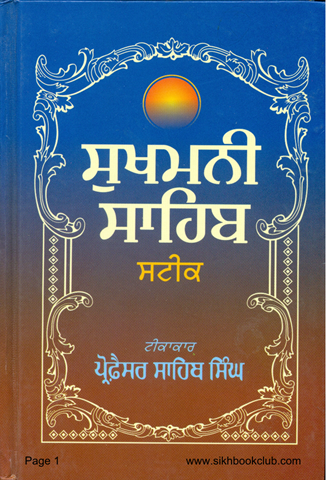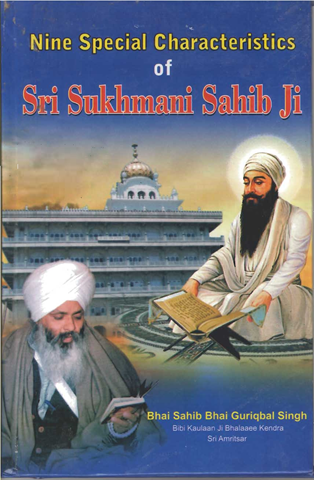


The first seven stanzas of the astpadi explore the theme stated in the preceding sloka and the eight sometimes sums up the astpadi but, more often, becomes a paean of praise lacing the theme in the context of an overall vision of Eternal Reality. A sloka or couplet precedes each astpadi. The Sukhmani Sahib comprises twenty-four astpadis or cantos, each comprising eight stanzas. ISBN 978-81-8.Sukhmani Sahib Sukhmani, titled Gauri Sukhmani in the Guru Granth Sahib after the musical measure Gauri to which it belongs, is a lengthy composition by Guru Arjan Dev Ji composed around AD 1602-03 on the bank of Ramsar pool in the city of Amritsar. Eternal Glory of Baba Nand Singh Ji Maharaj of Kaleran, Part 1. Journal of Sikh Studies, Department of Guru Nanak Studies, Guru Nanak Dev University.
 ^ "Semiotics of Simran in Sukhmani Sahib". ^ The Sikh Review, Sikh Cultural Centre. New Delhi: Atlantic Publishers & Distributors. New Delhi: Atlantic Publishers and Distribution. The Encyclopedia of Sikhism (over 1000 Entries) (Second ed.). Prominent Sikh saint Baba Nand Singh would tell Sikhs to recite Sukhmani Sahib twice daily. The Guru compiled it at Ramsar Sarovar (Sacred pool), Amritsar which at the time was in thick woods. Sukhmani Sahib was composed by Guru Arjan around 1602 before he compiled the Adi Granth. Before the Ashtpadi begins there is a Salok of two lines and then each Ashtpadi contains eight padas of 10 hymns per pada. The Ashtpada is the Sanskrit word for a verse that has eight ( Asht) metrical feet ( pādi). Sukhmani Sahib is divided into 24 Ashtpadi (Section). The term Sukhmani comprises two words: Sukh (peace) and Mani (the treasure or jewel of the mind) It typically is found in Gutka form (small prayer book). Sukhmani Sahib belongs to the Raag Gauri with Gauri meaning pure. Reciting the Gurbani of Sukhmani Sahib is believed to bring peace to one's mind and aid help remembering God constantly. Reciting the entire Sukhmani Sahib takes about 60 to 90 minutes, and is sometimes undertaken by everyone in a smaller congregation with turn by turn reading. It can be done individually or as a group usually in either a place of worship ( Gurdwara) or at home. Sukhmani Sahib is frequently recited by Sikhs is one of the popular Banis (compositions of the Guru).
^ "Semiotics of Simran in Sukhmani Sahib". ^ The Sikh Review, Sikh Cultural Centre. New Delhi: Atlantic Publishers & Distributors. New Delhi: Atlantic Publishers and Distribution. The Encyclopedia of Sikhism (over 1000 Entries) (Second ed.). Prominent Sikh saint Baba Nand Singh would tell Sikhs to recite Sukhmani Sahib twice daily. The Guru compiled it at Ramsar Sarovar (Sacred pool), Amritsar which at the time was in thick woods. Sukhmani Sahib was composed by Guru Arjan around 1602 before he compiled the Adi Granth. Before the Ashtpadi begins there is a Salok of two lines and then each Ashtpadi contains eight padas of 10 hymns per pada. The Ashtpada is the Sanskrit word for a verse that has eight ( Asht) metrical feet ( pādi). Sukhmani Sahib is divided into 24 Ashtpadi (Section). The term Sukhmani comprises two words: Sukh (peace) and Mani (the treasure or jewel of the mind) It typically is found in Gutka form (small prayer book). Sukhmani Sahib belongs to the Raag Gauri with Gauri meaning pure. Reciting the Gurbani of Sukhmani Sahib is believed to bring peace to one's mind and aid help remembering God constantly. Reciting the entire Sukhmani Sahib takes about 60 to 90 minutes, and is sometimes undertaken by everyone in a smaller congregation with turn by turn reading. It can be done individually or as a group usually in either a place of worship ( Gurdwara) or at home. Sukhmani Sahib is frequently recited by Sikhs is one of the popular Banis (compositions of the Guru). 
Sukhmani Sahib being recited as a group at Gurdwara Ameerpet, Hyderabad, India.








 0 kommentar(er)
0 kommentar(er)
